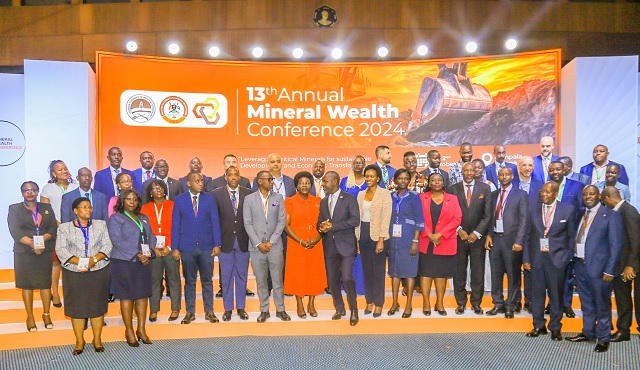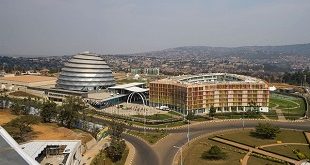
The conference concluded with a strong emphasis on national content development, recommending that mining regulations incorporate strategies to boost Ugandan participation
Kampala, Uganda | JULIUS BUSINGE | The urgent need for increased funding in Uganda’s mineral sector took center stage at the 13th Mineral Wealth Conference, held in Kampala from Oct.1-2. Key stakeholders from the government, private sector, and mining industry gathered to address pressing issues and develop a strategic roadmap for the future.
The event, organized by the Uganda Chamber of Mines and Petroleum, the Ministry of Energy and Mineral Development, and the Minerals Africa Development Institution (MADI), focused on the theme “Leveraging Critical Minerals for Sustainable Development and Economic Transformation.”
One of the primary recommendations was a substantial increase in the sector’s budget allocation, which currently stands at less than Shs 50 billion for this financial year. Stakeholders underscored the necessity of annual budget increments to facilitate the quantification of Uganda’s mineral resources and improve data collection and distribution—critical elements for driving sector investment.
Similarly, access to capital emerged as another significant challenge for private sector players. In response, participants proposed the establishment of a Mineral Fund, initiated by the government in partnership with the private sector. They also advocated for the issuance of government bonds in collaboration with local banks as a viable solution to unlock essential capital for the industry.
The conference also called for the creation of a Mining Institute, mirroring similar institutions in the oil and gas sector. This initiative aims to train geologists, metallurgists, and other mining professionals, ensuring a skilled workforce to propel the industry forward.
The operationalization of the Uganda National Mining Company was emphasized as a priority, with participants noting its vital role in safeguarding government interests and enhancing public-private collaboration for the industry’s long-term success. Additionally, stakeholders stressed the importance of rapidly drafting and gazetting regulations to fully implement the Mining and Minerals Act, 2022, which would foster a more conducive business environment and attract increased private sector participation.
Investment in infrastructure, particularly in roads and electricity in mining areas, was highlighted as crucial for reducing operational costs and enhancing the competitiveness of Uganda’s mining sector on the global stage. Participants encouraged the government to explore international auctions for mineral resources to attract foreign investors and facilitate technology transfer.
The discussion also addressed sector incentives, with calls for ongoing dialogue with the government to introduce tax rebates on VAT and corporate taxes to stimulate investment.
Multi-sector partnerships
Multi-sector partnerships were deemed essential for improving access to capital, training, and market development, as well as for organizing key industry events like the Mineral Wealth Conference. Such collaborations are expected to strengthen the sector and open new avenues for growth.
Market access for Ugandan minerals was another focal point, with participants urging the country to leverage regional and international trade agreements, such as the East African Community (EAC), COMESA, and the African Continental Free Trade Area (AfCFTA), to create more export opportunities.
For artisanal and small-scale miners (ASMs), the conference recommended the adoption of modern mining technologies to enhance safety and productivity. Capacity-building programs, developed in collaboration with the private sector, were proposed to equip ASMs with the skills necessary for more efficient operations.
Regional cooperation also featured prominently in discussions, with calls for the establishment of refineries and value-addition facilities benefiting not only Uganda but the entire region.
In light of global trends, participants emphasized the importance of aligning Uganda’s legal framework with Environment, Social, and Governance (ESG) standards, which are increasingly critical for attracting investments. They also advocated for the digitization of the mining sector, proposing the creation of an online cadastral system and enabling online registration for ASMs and licensing processes to enhance operational efficiency and transparency.
The conference concluded with a strong emphasis on national content development, recommending that mining regulations incorporate strategies to boost Ugandan participation through job creation and local community engagement, similar to initiatives seen in the oil and gas industry.
These recommendations are set to inform future policy and strategy, ensuring that Uganda’s mineral sector plays a pivotal role in the country’s socio-economic transformation. Aggrey Ashaba, chairman of the governing council of the Uganda Chamber of Mines and Petroleum, presented the proposals to President Yoweri Museveni, represented by Prime Minister Robinah Nabbanja, who pledged to advocate for their implementation.
Ashaba expressed optimism about the sector’s growth potential, stating, “Currently contributing 2.2% to GDP in FY 2022/23, this could rise to 7% or more, as reported in the 1950s and 1960s, through resource quantification, formalization of artisanal miners, and infrastructure enhancements.”
 The Independent Uganda: You get the Truth we Pay the Price
The Independent Uganda: You get the Truth we Pay the Price



